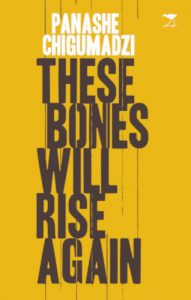Chigumadzi’s exploration of personal, family and national history reincarnates in stark, vivid images, many of those interred in the shadows of her country’s ‘Big Men’.
—Tsitsi Dangarembga, author of Nervous Conditions
The JRB is proud to present an exclusive excerpt from The JRB Contributing Editor Panashe Chigumadzi’s new book These Bones Will Rise Again.
 These Bones Will Rise Again
These Bones Will Rise Again
Panashe Chigumadzi
Jacana Media, 2018
Elsewhere in this issue, Chigumadzi discusses her book with Novuyo Rosa Tshuma, whose new novel House of Stone is a remarkably similar project, in fiction form.
- Read that conversation here
- Read: Panashe Chigumadzi reflects on Zimbabwe’s ‘coup that was not a coup’ in her new book, These Bones Will Rise Again
Chigumadzi is in South Africa to launch her new book in August. See her tour schedule here.
~~~
Read the excerpt:
I
‘Mudzimu waivepiko, mudzimu mukuru isu tichinetseka?’
The Jairos Jiri Band asks this of me as I listen to them over my iPhone speaker. Where was our ancestor spirit, our great ancestor, while we were suffering? Someone had just sent their song ‘Take Cover’ to one of the many WhatsApp groups keeping me updated with the latest in fake and genuine news of what was happening in Zimbabwe. The day before we had seen the videos of tanks moving on the outskirts of Harare after army chief Constantino Chiwenga denounced Robert Mugabe’s sacking of then Vice-President Emmerson Mnangagwa. My friends in Zimbabwe told me about the gunfire they heard. By the morning we had all seen the shaky recordings of the Zimbabwe Broadcasting Corporation (ZBC) announcement in which Major General Sibusiso Busi Moyo declared that the army had taken over. Apparently it was not a coup. Mugabe was safe. They were ‘only targeting criminals around him’. The army was merely safeguarding the legacy of the liberation struggle, lest it be betrayed.
When I forward the clip of ‘Take Cover’ to my friend, she in turn shares her recordings of the Chimurenga music playing on ZBC that morning. She says she is feeling patriotic. Apparently, so are a number of other Zimbabweans on my Twitter timeline.
Zimbabwe has had many versions of history. The history of this moment, that some are already beginning to tell, is that this is the ‘Fourth Chimurenga’.
As I listen to the Jairos Jiri Band, I am unsteady. Mugabe’s impending removal feels as if the bottom half of one of Zimbabwe’s famous granite balancing rocks is being dislodged while we are still sitting on top of it. Where we are, suspended perilously above the ground, is not good, but where are we going to fall? What are we going to fall onto?
There are many questions and I am looking for answers. The kind of answers that slip past the facts of history books or analyses by pundits and experts. Answers that are not party politics. That are not Zimbabwe African National Union—Patriotic Front (ZANU–PF), or Zimbabwe African People’s Union (ZAPU) or the Movement for Democratic Change (MDC). Answers that are not Cecil John Rhodes, Ian Smith, Joshua Nkomo, Robert Mugabe, Morgan Tsvangirai or Emmerson Mnangagwa, or any other Big Men in the history of the nation. Instead, the answers I need are answers to politics that are about how we live, hope, dream, cry, laugh, pray and believe. As I search, I realise that if I want different answers, I need different questions. The kind that the Jairos Jiri Band is asking: ‘Where was our ancestor spirit, our great ancestor, while we were suffering?’
In the midst of the confusion, I turn to a more familiar song: Thomas Mapfumo’s ‘Mhondoro’. My Shona is proficient but not literary. The long-exiled Mapfumo, whose lyrics are less ambiguous in their revolutionary message, should have been far easier for me to understand. He had not really featured in our household, despite the fact that he, along with family favourite Oliver Mtukudzi, played music based on the mbira dzevadzimu, the mbira of the ancestors, an instrument of the Shona people, discouraged from being played by both missionaries and the Rhodesian state. The colonisers were right. They recognised that the mbira is dangerous—a mouth through which spirits can stir up their people.
- Panashe Chigumadzi, the founding editor of Vanguard Magazine in South Africa and The JRB Contributing Editor, is the author of a novel, Sweet Medicine (2015), and a forthcoming collection of essays, Beautiful Hair for a Landless People.





